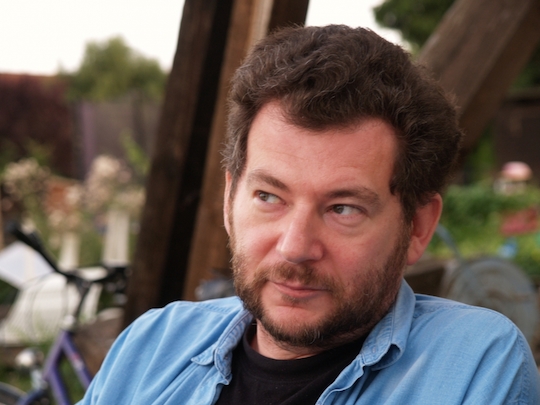A sunny winter in Florence.
Early morning—blue and gold, and
the black Florentine air—eeny meeny miney moe—has completely vanished from the city: and is now wrapping up and flowing down the hills that are more orbital than surrounding.
Above the hills—the still-white night sky slowly turns blue. And between the hills, red Tuscan brushwood burns, which will soon become gold…
The conjoined sky.
The mooing hills.
The well-defined valleys.
The cypresses are like folded umbrellas,
and the stone pines—unfolded.
Under the stone pines and cypresses, Italians brushed the drips from their gray hair in the rear-view mirrors of their own and others’ motor scooters and sang sweetly with voices as hoarse as though they had an Italian three-day stubble.
February in the vineyards.
A cat crossing the road.
Someone is throwing bottles into the glass bin with such force and regularity that it seems as if glass logs are being chopped.
Suddenly, the cow moaned like a door.
A cat is slowly crossing the road with a hollow back and an ass like a cow. Were it not for the ears and tail, it would have looked like a little black cow.
Bare vineyards in the snow.
One couldn’t now guess what they are growing here. Since it’s laid out like a concentration camp it must be barbed wire.
From under the snow the horrified little birds making smacking sounds at the approaching cat.
A Highway Over the Sea: Love for One’s Homeland
A fire in a roadside bush. The silver flame dances to the tips of the broken twigs, and then, having nowhere left to go, leaps off and vanishes into the darkness. The entire slope, the entire Adriatic coast, is just about to flare up.
Cars slow down, as if looking back. But only one stops—an ice-cream truck covered with painted zebras. The driver gets out, rolling a fire extinguisher in a camo t-shirt. He rolls and shakes it, then stops short and for an instant presses his ear against it, before letting it roll, fatefully, from his stomach down the hill and into the shining sea.
He returned to the truck, and turning carefully to the left, then to the right, into the burning bush, he began tossing colorful grenades wrapped in silvery foil—cones, cylinders, and cubes.
***
Read the Russian and English texts side by side here.
And read original poetry by Aleksey Porvin in Asymptote here.
***
Oleg Yuriev is a poet, prose-writer, playwright and literary critic born in Leningrad and currently living in Frankfurt am Main. His poems and prose works can be found in Ural, Volga, Znamia, Zvezda and many other literature magazines. He is author of numerous books in Russian: Frankfurt’s Bull (Moscow, Zakhariadi publishing house), New Golem or War between old men and kids (Moscow – Jerusalem: Bridges of Culture/Gesharim, 2004) and others. Yuriev is also author of books in German: Leningrader Geschichten (edition solitude, Stuttgart, 1994), Frankfurter Stier (Edition Pixis, München — Berlin, 1996), Halbinsel Judatin (Volk und Welt, Berlin, 1999), Spaziergänge unter dem Hohlmond (Suhrkamp, Frankfurt am Main, 2002), Der neue Golem oder Der Krieg der Kinder und Greise (Suhrkamp, Frankfurt am Main, 2003) and others. In 2010 Oleg Yuriev was awarded Hilde-Domin-Preis für Literatur im Exil.
Aleksey Porvin is a poet and translator born in Leningrad. His poems can be found in World Literature Today, Cyphers, Saint-Petersburg Review, Ryga Journal, SUSS, Words Without Borders, Fogged Clarity, The Straddler, The Dirty Goat, Action Yes, Barnwood International Poetry Mag, Otis Nebula, New Madrid, The Cafe Review, The New Formalist etc. Porvin is author of two collections of poems in Russian – Darkness is White (Argo-Risk Press, Moscow, 2009) and Poems (New Literature Observer Press, Moscow 2011). His first book of poems translated into English, Live By Fire, was published by Cold Hub Press in 2011. Poems by Porvin have recently been short-listed for the Andrey Bely Prize (2011). Aleksey Porvin is a winner of The Russian Debut Prize (2012).

